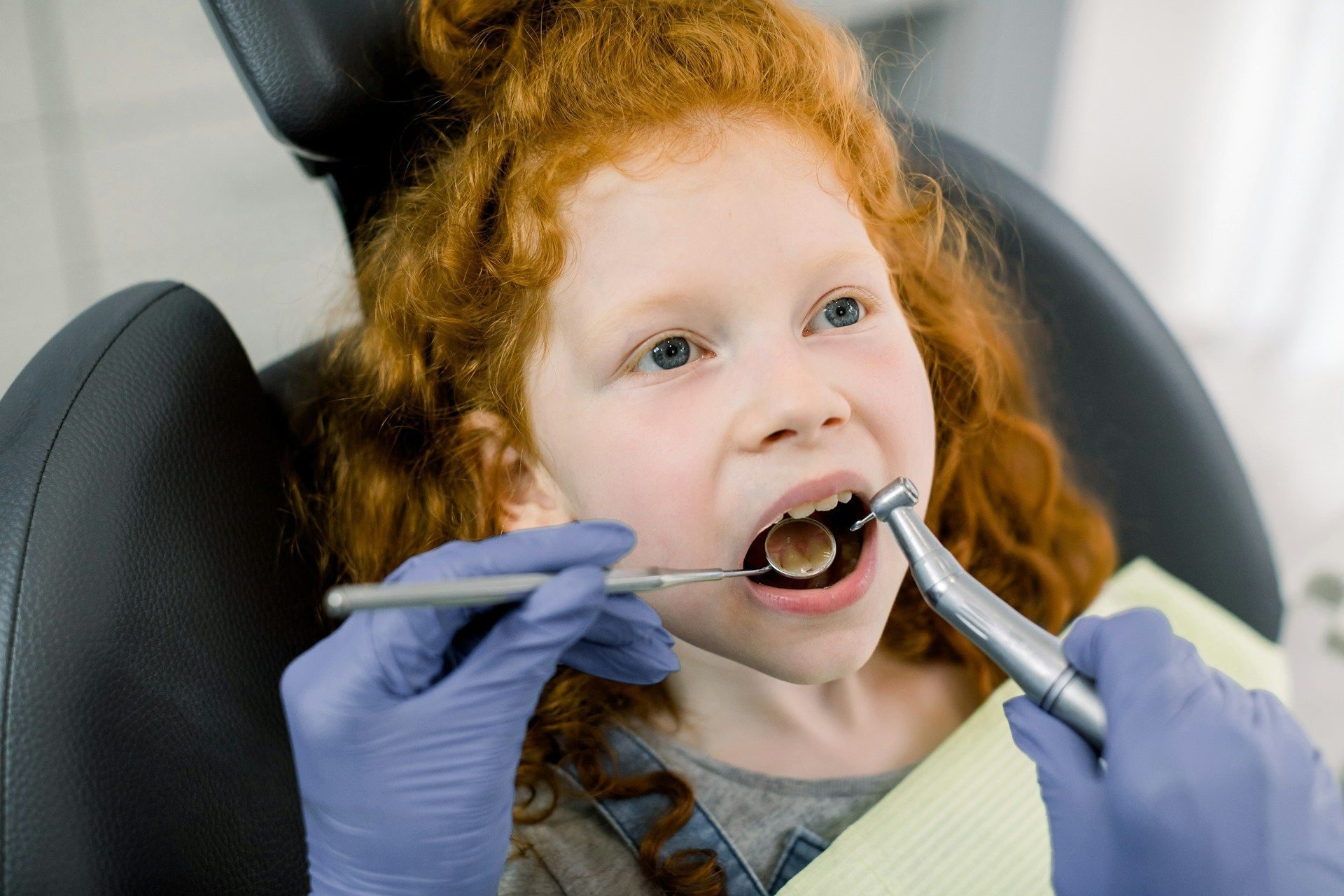Help Your Child Overcome Fear of the Dentist
Going to the dentist can be a scary experience for many children. The unfamiliar environment, strange sounds, and fear of pain can all contribute to anxiety and stress. As a parent, it's essential to understand these fears and find ways to help your child feel more comfortable and confident during dental visits. Addressing dental anxiety early can lead to better oral health habits and a lifetime of positive dental experiences.
In this blog post, we will explore various strategies to help ease your child's fear of the dentist. From understanding the root causes of their anxiety to practical tips for making dental visits more pleasant, our goal is to provide you with the tools and knowledge to support your child's dental health journey effectively.
Understanding Your Child’s Dental Anxiety
Common Causes of Fear
Understanding why your child fears the dentist is the first step in helping them overcome it. Common causes include fear of the unknown, previous negative experiences, and stories they've heard from others. The sights, sounds, and smells of a dental office can also be overwhelming. Many children fear the potential pain or discomfort associated with dental procedures, even if they've never experienced it before. Additionally, the perceived loss of control in the dental chair can heighten their anxiety. Recognizing these triggers can help you address and alleviate your child's fears more effectively.
How Anxiety Manifests in Children
Dental anxiety can manifest in various ways. Some children may become visibly upset, crying or refusing to enter the dental office. Others might display nervousness through physical symptoms like sweating, shaking, or rapid breathing. Many children will repeatedly ask questions about what will happen, showing they are seeking reassurance. In some cases, children might complain of stomachaches or other physical ailments as a way to avoid going to the dentist. Being aware of these signs allows you to identify when your child is anxious and helps you take steps to calm them.
Long-term Effects of Dental Anxiety
If left unaddressed, dental anxiety can have long-term effects on your child's oral health. Avoiding dental visits due to fear can lead to poor oral hygiene, cavities, and other dental issues that could have been prevented or treated early. Dental anxiety can also carry over into adulthood, making it difficult for them to seek regular dental care as they grow older. This cycle can result in more severe dental problems and an increased need for extensive treatments, which could further reinforce their fear of the dentist. Addressing dental anxiety early on sets the foundation for a lifetime of positive dental experiences.
Strategies to Help Ease Dental Fears
Preparing for the Visit at Home
One of the best ways to ease dental fears is by preparing your child for what to expect. Talk to them about the upcoming visit in a positive, reassuring manner. You can read books or watch videos about visiting the dentist to familiarize them with the process. Role-playing can also be effective; pretending to be the dentist and patient can make the experience feel more familiar and less intimidating. Explain the importance of dental care and what will happen at the appointment so they feel more in control and less anxious.
Positive Reinforcement and Rewards
Using positive reinforcement can encourage your child to face their dental fears bravely. Offer praise and small rewards for their cooperation and courage during the visit. This could be a favorite treat, a special outing, or extra playtime. The key is to make the dentist visit feel like an achievement rather than a chore. Gradually, your child will start associating dental visits with positive experiences, reducing their overall anxiety. Consistently reinforcing the idea that they did well helps build their confidence for future visits.
Importance of a Trusting Dentist-Patient Relationship
Establishing a trusting relationship between your child and their dentist is crucial. Seek out a pediatric dentist who is experienced in working with anxious children and can communicate effectively at their level. A dentist who takes the time to explain procedures, answers questions patiently, and interacts warmly can make a significant difference. Bringing your child to the same dentist for regular check-ups helps build familiarity and trust over time. When your child feels comfortable with their dentist, they are more likely to have a positive experience and less anxiety about future visits.
In-Office Techniques to Calm Your Child
Distraction Methods During the Visit
Dentist offices often use distraction techniques to help reduce anxiety. Toys, books, and videos can capture your child’s attention and divert their mind from the dental procedures. Some dental offices offer movies or TV shows that kids can watch during their appointment. Music and headphones can also help create a relaxing environment. Giving your child something to hold, like a favorite stuffed animal, can provide comfort and a sense of security. These distractions can make the experience less intimidating and more enjoyable for your child.
Use of Gentle Communication and Explanations
Clear and gentle communication is key to easing dental fear. Dentists who take the time to explain each step of the procedure in simple terms can demystify the process. Telling children what to expect and using child-friendly language helps them feel informed and less scared. It’s also helpful when the dentist checks in with the child throughout the appointment, offering reassurance and praise for their bravery. This open line of communication builds trust and makes the child feel involved and respected, reducing anxiety.
Role of Sedation Dentistry for Severe Anxiety
For children with severe dental anxiety, sedation dentistry can be a viable option. There are different levels of sedation, from mild relaxants to full sedation, depending on the child’s needs and the procedure’s complexity. Nitrous oxide, commonly known as laughing gas, is a gentle option that helps children relax while remaining conscious. In more extreme cases, oral sedatives or IV sedation might be necessary. Always discuss these options with your dentist to determine the best and safest approach for your child’s specific situation. Properly used sedation can make dental visits painless and stress-free.
Post-Visit Care and Reinforcement
Celebrating the Visit Success
After the dental visit, it’s important to celebrate your child’s bravery. Acknowledging their courage can reinforce positive feelings about the dentist. You could give them a small treat, a sticker, or even just extra praise and encouragement. Letting them know they did a great job helps build their confidence for future visits. Creating a positive end to the appointment can make the whole experience feel like an accomplishment, reducing fear and anxiety over time.
Building a Positive Dental Routine
Establishing a regular dental routine at home can further alleviate the fear of the dentist. Brushing and flossing together can be a fun and educational experience. Using reward charts for daily oral hygiene can also motivate your child to take care of their teeth. Explain how these habits help them avoid dental problems and make dentist visits quicker and easier. When children understand the importance of good oral care, they are more likely to approach dental visits without fear.
Scheduling Regular Check-Ups for Consistency
Consistency is key to overcoming dental anxiety. Regular check-ups make the dentist’s office a familiar place, reducing fear of the unknown. When dentist visits become a routine part of life, anxiety tends to decrease. Stick to the recommended schedule for dental check-ups to ensure your child’s oral health is monitored and maintained. Regular visits also allow for early detection and treatment of potential issues, making each visit less stressful and more routine.
Conclusion
Helping your child overcome their fear of the dentist is a process that requires patience, understanding, and the right strategies. By identifying the causes of their anxiety and implementing techniques both at home and in the dental office, you can make dental visits less intimidating. Encouraging a trusting relationship with the dentist, using positive reinforcement, and maintaining consistent dental care routines go a long way in reducing fear.
Remember, dental health is crucial for your child's overall well-being. Addressing dental anxiety now can set the foundation for a lifetime of positive dental experiences and healthy habits. Taking these steps will not only make dental visits easier but will also ensure that your child receives the necessary care to keep their smile bright and healthy.
If you need assistance or have concerns about your child's dental anxiety, the team at Elite Dental Pediatrics in Houston, Texas, is here to help. Schedule an appointment today to ensure your child’s dental visits are as comfortable and positive as possible with our
Houston sedation dentistry!










